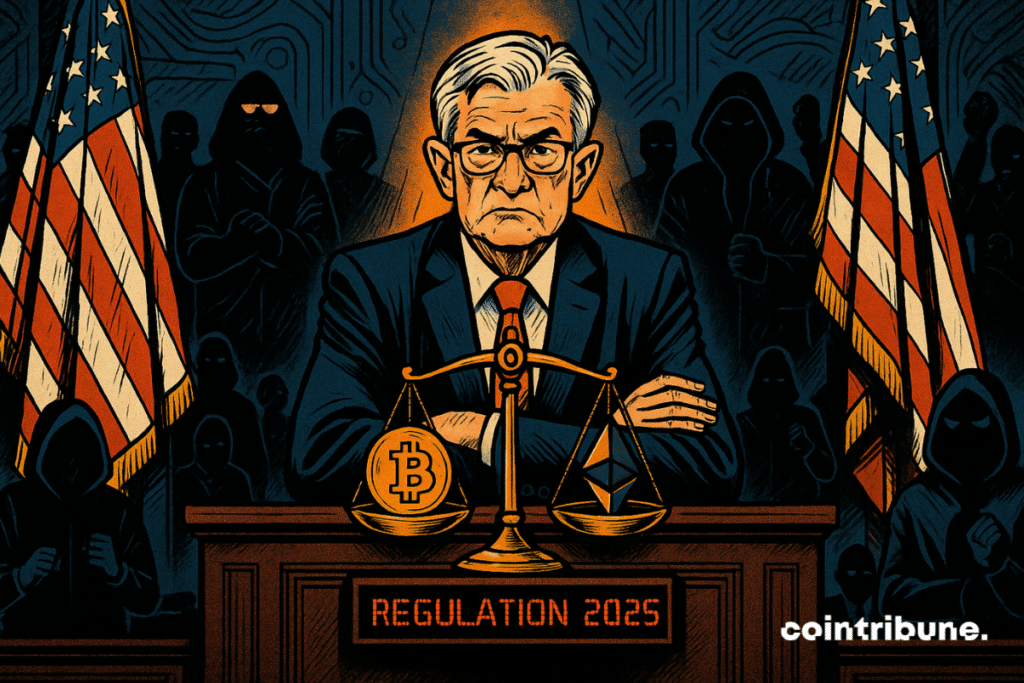Fed & Trump Unite: Game-Changing Digital Asset Regulations Loom in 2025
Washington's strangest bedfellows just sparked a crypto earthquake.
The Federal Reserve and former President Trump—arch-nemeses in monetary policy—are suddenly aligned on one explosive issue: fast-tracking comprehensive digital asset rules. This isn't just regulatory chatter—it's a tectonic shift that could redefine finance.
Wall Street's already placing bets (with other people's money, naturally). Institutional capital's been circling crypto like vultures since 2024's ETF approvals, but this political detente removes the last perceived roadblock. The Fed's involvement suggests they see dollar-pegged stablecoins as inevitable—and want control before China or Europe set the rules.
Meanwhile, crypto exchanges are quietly lobbying for 'innovation-friendly' frameworks—bank-speak for 'let us print fees without those pesky consumer protections.'
One thing's certain: when traditional finance and populist politics collide over blockchain, grab popcorn—and maybe some Bitcoin. The only thing Washington loves more than regulation is the campaign donations that come from delaying it.

In brief
- Jerome Powell, Chairman of the Fed, calls the progress of crypto laws in the U.S. Congress “a great thing.”
- The GENIUS Act, recently passed by the Senate, aims to regulate stablecoins at the federal level with broad political support.
- Powell stresses the urgency of establishing a specific framework for stablecoins, breaking with the Fed’s previous cautious stance.
- Donald Trump publicly supports the GENIUS Act and urges its swift adoption by the House of Representatives.
Powell validates the urgency of a framework for stablecoins
While the Fed changes its strategy on banks’ crypto activities, during his June 18 testimony before Congress, the chairman of the U.S. Federal Reserve, Jerome Powell, stated that the legislative progress on crypto was “an excellent thing” adding that “we need a framework for stablecoins“.
This clear stance contrasts with the caution shown by the Fed in recent years. Such a statement comes as the bipartisan GENIUS Act, aimed at regulating stablecoins, was just approved by the Senate 68 to 30.
BTCUSDT chart by TradingViewPowell, who advocated in 2021 for regulation similar to bank deposits and money market funds, now integrates the Fed into a supportive rather than wary role.
This bill, which could be enacted as early as this summer if the House of Representatives follows, marks a major regulatory turning point. It notably provides for :
- A clear federal framework for issuing and trading stablecoins, with centralized regulatory oversight ;
- Reserve and transparency requirements aimed at ensuring the stability and solvency of stablecoin issuers ;
- A rare political consensus, supported by Donald Trump, who called the bill “incredible” and presented it as a lever for making the United States “the undisputed leader of crypto” ;
- An unprecedented alignment between the Fed, Congress, and the executive, which could speed up the adoption of a long-awaited legal framework by the industry.
For many industry players, the Fed’s recognition of the importance of such a framework is a decisive, even historic, signal. It could trigger a new cycle of institutional investment and give the United States a strategic advantage in the international digital currency competition.
Towards the end of “debanking” and a banking climate more favorable to cryptos
Beyond the question of stablecoins, Jerome Powell also made a strategic shift by announcing that the Fed WOULD no longer “take reputational risk into account” in assessing banking activities.
A decision with major repercussions, as this notion has been repeatedly invoked in recent years to justify excluding clients or partners linked to crypto. Asked about the subject, Powell specified: “Banks are also free to conduct crypto-related activities, provided they do so in a way that preserves safety and financial soundness.”
In other words, banks can now work with crypto players without fearing penalties due to image considerations.
This new approach comes amid investigations by Republicans into alleged “banking exclusion” cases under the Biden administration, where some entities were reportedly denied banking access due to their crypto-related activities.
Powell acknowledged the phenomenon: “During 2024, we came to the conclusion that this was a serious problem that needed to be resolved.”
This paradigm shift seems to already be producing effects. JP Morgan, through Jamie Dimon, a known Bitcoin critic, confirmed that its clients can now buy BTC via the bank.
These signals confirm a gradual realignment of the traditional financial system with crypto market logic. By recognizing past mistakes linked to banking exclusion, the Fed opens a clearer space for collaboration between financial institutions and blockchain companies. This could encourage a massive return of banks to the American crypto ecosystem as rules become clearer. If the trend is confirmed, the United States could regain a leadership position in financial innovation, just as Europe implements MiCA and Asia accelerates its own projects.
Maximize your Cointribune experience with our "Read to Earn" program! For every article you read, earn points and access exclusive rewards. Sign up now and start earning benefits.

